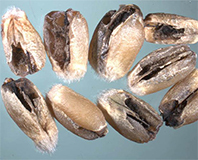Read the latest information on
Foot-and-mouth disease

Imagine sowing, waiting for rain, and having your harvested grain look like this. It could happen if Karnal bunt made its way into Australia via returning travellers.
Farmers, researchers, agronomists, government agency staff, scholarship recipients and tourists from rural areas need to be hyper vigilant with their hygiene practices when returning from overseas trips.
Grains Farm Biosecurity Officer, Jim Moran, says that by taking unnecessary risks with hygiene, people are putting Australia’s agricultural industries at risk.
“Just because you get through customs at Tullamarine or Sydney doesn’t mean you are not posing an enormous risk to our grains industry upon your return,” Mr Moran said.
“That’s not good enough, and it’s got to stop.” Mr Moran said.
“Overseas, you are exposed to pests, weeds and diseases that are endemic in these countries and their presence on you, your personal items and luggage may not be obvious.”
“When you return to Australia, you could be bringing these unwanted curses with you.”
“Biosecurity is everyone’s responsibility. Think about where you have been and what you might have come in contact with. It’s up to you to make sure you are not bringing something back with you. Don’t leave it up to inspectors at the boarder to catch you out.”
“For the grains industry alone, there are over 300 exotic pests and diseases we can do without.”
These pests would be enormously destructive to our current farming systems. They would upset or stop our export markets and increase the costs of growing crops. Examples include the khapra beetle, Karnal bunt, hessian fly, wheat stem sawfly which are present in countries we visit, do research in and visit trial sites.
So, if you are visiting farms and rural regions overseas and walking through crops, getting dirt on your shoes and handling plant material, please take care not to bring pests and diseases back home with you.
Comply fully with quarantine border restrictions, and declare any food, plant material or animal products that you are carrying to biosecurity officers when you arrive in Australia.
Before you pack to return to Australia, wash your cloths and clean your footwear. If that’s not possible, do it immediately when you return. Footwear should also be disinfected using a disinfectant, bleach or an alcohol/water mix if possible.
If you have been somewhere that poses a particularly high risk, such as an area you know is infested, consider leaving your clothing and footwear behind.
Using a wet cloth, wipe down non-washable items such as suitcases, iPhones, iPads, camera bags, watchbands and belts. Disinfectant wipes are good for this.
Also remind family members, employees and others travelling with you to take these precautions too.
For more information visit the Department of Agriculture and Water Resources travel site.
Further information about pests, grains farm biosecurity manuals and fact sheets are available on the Grains Farm Biosecurity Program section of the Plant Health Australia website.
Please contact Jim Moran on 03 5430 4479 for more information including fact sheets on biosecurity for overseas trips as well as the Biosecurity Manual for Grain Producers.
If you see any unusual pests or disease symptoms, call the Exotic Plant Pest Hotline 1800 084 881.